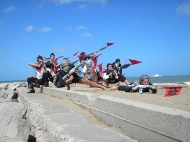Arrhythmias of Counter-Production: Engaged Art in Argentina, 1995–2011
Date uploaded: October 3, 2011
Arrhythmias of Counter-Production: Engaged Art in Argentina, 1995–2011
6th October 2011 – 20th January 2012
Curated by Jennifer Flores Sternad
Participating Artists: Grupo de Arte Callejero (GAC), Etcétera… and the Errorist International, Taller Popular de Serigrafía, Eduardo Molinari / Archivo Caminante, Iconoclasistas, Julian D’Angiolillo, Ala Plástica, and Diego de la Vega with Archivo Provincial de la Memoria and Colectivo La Tribu.
The University Art Gallery (UAG) at the University of California, San Diego present an exhibition of Argentine political art produced in the public sphere over the past fifteen years. Most of the works included in this exhibition are being presented in the United States for the first time. Arrhythmias of Counter-Production: Engaged Art in Argentina, 1995–2011 is running from October 6 to January 20 with an opening reception with the curator on October 6 at 5:30pm. The exhibit was curated especially for the UAG by Jennifer Flores Sternad, a doctoral candidate in the Department of Social and Cultural Analysis at NYU and a leading critic and scholar of political art in the Americas.
Arrhythmias will showcase art practices developed in Argentina since the mid-1990s that demonstrate exceptionally creative, and widely diverse, modes of engagement with present-day social and political struggles. The artists featured in the exhibition combine artistic practices and the pursuit of creative experimentation with methodologies and epistemologies, such as those associated with militant research, radical pedagogy, direct action, community organizing, critical cartography, tactical media and Brechtian theater. Many of the projects in the exhibition were developed through direct contact with, or in explicit alignment with, left social movements. In some cases, the artistic practice was coextensive with popular forms of struggle or grass-roots organizing. Other projects include anti-imperialist historiographical interventions that interweave the Southern Cone's colonial history with its present-day neoliberal order, studies of vast informal economies and the migrant and local labor that sustains them, and provocative street performances and media interventions that reveal the logic behind the discursive and legal system of anti-terrorism.
If, as Ruth Gilmore writes, "Crisis signals systemic social change whose outcome is determined through struggle," the works in this exhibition trace the contours of this struggle over the past decade, up to the present. In doing so, they reject official representations of stability and development, defy the image of a kinder and gentler "normal" capitalism and interrogate the political theater through which these ideas are promoted. Dismantling the narrative of crisis and "recovery," they instead reveal the conditions of stability for the crisis state, and what it costs in labor, terror and even life.
Gallery Hours: Tuesday & Thursday 11:00am–5:00pm, Wednesday & Friday 11:00am–7:30pm.

